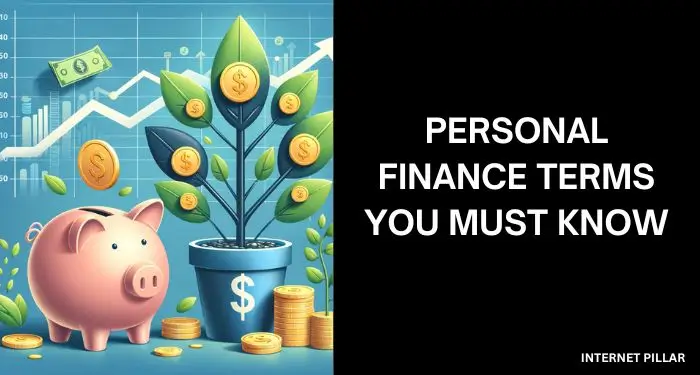Understanding personal finance terms and lingo is important to navigating your financial future.
Diving into financial planning might feel daunting due to unfamiliar terms especially for beginners.
This glossary breaks down basic personal financial terms to simplify your journey into managing your money.
It’s useful whether you’re eyeing a finance career or just want to get a grip on your own budget.

Knowing these finance terms helps in making informed choices while chatting with professionals like tax accountants and discussing money matters with colleagues or investors.
Here are some of the top personal finance terms that you should know.
41 Personal Finance Terms You Must Know
Assets
Assets are what your business owns that has value. This includes things like the money owed to you equipment and buildings.

Assets come in different forms such as current (short-term), fixed (long-term), tangible (physical) and intangible (non-physical).
Amortization
Amortization is about spreading the cost of non-physical assets like patents or trademarks over their useful life.
It helps in gradually reducing the value of these intangible assets in your books.
APR (Annual Percentage Rate)
APR is the yearly cost of borrowing money shown as a percentage. It reflects the annual interest rate you pay on loans or earn through investments.
Asset allocation
This is how a business decides to spread its investments across different types of assets like cash, stocks and bonds.
It’s all about balancing risk and potential profit. Over time a business might change its asset mix to meet goals or improve returns.
Borrower

A borrower is an individual or business that takes something usually money from a lender like a bank.
The borrower agrees to pay back the borrowed amount plus any interest.
Budget
A budget is your financial plan mapping out expected income and expenses. It’s a tool to help you manage money focus on reducing debt and save for future goals.
Bankruptcy

Bankruptcy is a legal way for people or businesses drowning in debt to get a fresh start by having some or all of their debts wiped out.
Beneficiary
A beneficiary is the person or entity chosen to receive benefits or proceeds from an insurance policy or will.
This could be a family member a charity or anyone the policyholder chooses.
Bonds
Bonds are like loans investors give to entities like the government or companies. In return the bond issuer repays the loan with interest over time.
Bonds are generally seen as safer than stocks.
Capital gains
Capital gains occur when you sell an asset for more than its purchase price. This can apply to stocks real estate and other investments.
Depending on where you live and the asset you might owe taxes on these gains.
Certificate of Deposit (CD)
A CD is a special bank account that holds your money for a set period.
It pays more interest than regular savings accounts but you’ll face penalties if you withdraw early.
Checking Account
A checking account at a bank or a share draft account at a credit union lets you deposit money pay bills and withdraw funds.
Credit
Credit is an agreement where a lender gives money to a borrower who promises to repay it.
Trustworthiness is shown by consistently repaying credit on time with credit cards being a common way to buy on credit.
Credit Limit
The credit limit is the max amount you can spend on a credit card or revolving credit account set by the issuer based on your credit report.
Compound Interest

Compound interest means earning interest on both your savings and the previously earned interest leading to faster growth of your investment.
Credit Score
Your credit score like the FICO Score used by most U.S lenders reflects your financial history and helps lenders decide if you qualify for a loan.
Debt Consolidation
Debt consolidation combines multiple debts into one new loan potentially simplifying payments but it doesn’t erase the debt and may cost more in the long run.
Dollar-Cost Averaging
This investment strategy involves consistently investing the same amount of money over time regardless of market fluctuations.
Debit
In accounting a debit entry records increases in assets or decreases in liabilities like when you make a payment.
Down Payment
A down payment is an initial cash payment for a purchase on credit reducing the borrowed amount for items like homes or vehicles.
Dividends
Dividends are profits shared by a company with its shareholders paid out regularly in cash stock or other forms.
Depreciation
Depreciation is about how much value an asset loses over time. It’s a key concept in accounting showing how much of an asset a business has used up during a certain period.
Emergency Fund
An emergency fund is cash saved up for unexpected situations. It could help cover big costs if you’re out of a job or smaller sudden expenses like fixing your car.
Estate Planning
Estate planning is getting your finances in order for when you pass away.
This involves making a will, choosing someone to make decisions for you if you can’t checking your life insurance and deciding who gets your stuff.
Financial Advisor
A financial advisor is someone who knows a lot about money and can help you with various financial goals.
They can assist with big-picture planning like retirement or specific goals like buying a house or a car.
Financial Statements
Financial statements are reports that show how a business is doing money-wise.
They include documents like the balance sheet and income statement which accountants use for taxes.
Income
Income is what you earn from selling things or from investments.
It’s not just about sales; it’s the total money coming in before taking out any costs.
Interest
Interest is what you pay for borrowing money calculated as a percentage of the borrowed amount.
There are two types: simple interest on just the principal amount and compound interest which adds up faster because it’s calculated on the principal plus any interest already paid.
Inflation
Inflation means prices for goods and services are going up which makes money worth less. This can affect your business because it means your cash buys less over time.
Investment
Investing is putting money into something like stocks or property hoping it will grow in value or bring in income.
It’s not guaranteed to make money and can be risky.
Mortgage
A mortgage is a loan for buying property. The lender can take the property if payments aren’t made.

Payments are usually made monthly over a long period like 10, 20 and 30 years.
Loan
A loan lets one person or group lend money or items to another expecting repayment within a set time often with added interest.
To get a loan you typically need to show why you need the money your financial status like credit score and job details and sometimes offer collateral.
Collateral means if you can’t pay back the loan the lender might take something of yours instead.
Liability
Liabilities are what a person or company owes like loans bills or credit card debt.
They’re categorized as current if they need to be paid within a year and non-current for longer-term debts like mortgages.
Liabilities are part of a company’s balance sheet showing what it owes versus what it owns.
Life Insurance
Life insurance is a way to financially protect your family if you pass away. You choose how much coverage you want and pay premiums over time.
It’s a safety net for your loved ones.
Net Worth
Your net worth is what you own minus what you owe. It’s the value of all your assets (like cash property investments) minus your debts.
Knowing your net worth helps you understand your financial health.
Savings Account
A savings account is for setting aside money you don’t need for daily expenses.
Banks might charge fees or set minimum balance rules but they also pay you interest because they use your money to lend to others.
Your savings are usually insured keeping your money safe.
529 Savings Plan
This education savings plan lets you invest in various options like mutual funds to save for school costs.
Your investment can grow or shrink with the market. These plans often state-sponsored can also cover K-12 tuition not just college.
401(k)
A 401(k) is a retirement savings plan offered by employers.
You can put part of your paycheck into this account usually before taxes are taken out to save for retirement. It’s a way to build a nest egg for your future.
Return on Investment (ROI)
ROI measures how much money you make from an investment compared to its cost. It’s a percentage showing the profit or loss of an investment.
Businesses use ROI to decide if a project is worth the investment.
Shareholder
If you own stock in a company you’re a shareholder. That means you own a piece of the company and can get dividends which are shares of the profit.
Shareholders have certain rights and responsibilities in the company.
Taxes
Taxes are what people and businesses pay to the government to fund public services like defense safety and infrastructure.
The amount you pay depends on where you live and how much you earn. Taxes support common needs and government functions.
So that’s it – I hope these personal finance glossary will help you to increase your financial acumen.